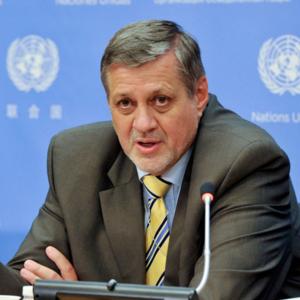Statement by SRSG for Iraq Jan Kubiš to Hand-in-hand towards liberation and stabilization conference
H.E President Dr. Fuad Masoum
H.E Speaker of the House Salim al - Jubouri
Representatives of Governorates
Excellencies
Esteemed participants
Thank you very much for this opportunity to speak at this important forum.
As I stand before you today, the terrorist organisation – ISIL with its radical ideology and policies of sectarianism, violent extremism and terrorism, presents a global and unprecedented threat to international peace and security. Fighting ISIL is thus a priority of the whole international community including Iraq and its heroic people that shall continue confronting the terrorism of ISIL in unity, stay united. While inclreasingly helping Iraq in fighting ISIL, all members of the International Community must respect the Iraqi sovereignty. I congratulate the Iraqi people and progovernment forces on their steady progress in liberating their country, most recently in Ramadi.
ISIL’s strategy is clear. It has aimed to rule through terror and violence. It has sought to radicalize Iraqis by exploiting many legitimate grievances. It has manipulated and cultivated divisions within society with the intent of exacerbating sectarian division, and exclusion.
While many Iraqis have suffered at the hands of ISIL, let us not forget that residents of the Governorates, present here today have been the main victims of ISIL’s atrocities. They have faced systematic abductions, killings and destruction of their property. Millions have been displaced or forced to flee and seek refuge, while many others have been executed or kidnapped. Millions more remain trapped in areas of fighting.
Regretfully, also in areas liberated from ISIL, there are reports of arbitrary arrests, killings, and destruction of property and increasingly also of efforts to forcibly change the demographic composition of these areas. To address these violations and to ensure that IDPs can return to their places of origin voluntarily, freely, in security and in full respect for their rights, the Government must continue to exert all its efforts to ensure that state authority, rule of law and justice are restored as quickly as possible.
This includes ensuring that responsibility for local security and the provision of basic services are returned to the local authorities together with the necessary funding, that local security forces are stong enough and well equipped to prevent violence against the civilian population, and ensure accountability for violations against civilians, such as returnees, who are attempting to rightfully reclaim their homes. Tribal and community reconciliation needs more robust support. The Government assisted by donors and the UN, needs to accelerate the subsequent phases of reconstruction and rehabilitiation.
Meanwhile, UN is playing a critical role in supporting IDPs through the efforts of its humanitarian community and in newly liberated areas, channeling fast track assistance to help towns and cities return to normalcy. The stabilization of Tikrit can be considered a success, as the majority of its displaced population, have returned home. UNDP, in coordination with the authorities, is already expanding its Stabilization Facility to other liberated areas including Al Saadiya in Diyala, Beiji and Al Dour in Salah al Din and Sinuni, Sinjar and Rabee’ah in Ninewa. Right now, it is prepositioning electricity grids for Ramadi.
The effort must, though, go far beyond this. PM Abadi, has rightly prioritized reforms to strengthen public sector efficiency, accountability and openness and to fight corruption. These measures must be implemented in a way that is meaningful to the public and positively impacts their day-to-day lives. Improving basic standards can only happen if the Government embarks upon devolution, decentralization and privatization to ensure provision of basic service delivery, to diversify its economy and to support private business, thereby stimulating efficiency, good governance, fight against corruption, economic growth and creating job opportunities.
Effective devolution should include not just responsibilities for administration, but also ability to raise and manage revenues. Administrative and fiscal decentralization can help make provincial and local authorities more accountable to their communities and to the state.
The United Nations supports these plans at all levels of government. For example, UNDP, on behalf of the UN Family has a compact with the Government of Basra to help strengthen the capacity of the Governorate to exercise the authority given to it under Law 21. Technical assistance is being provided across eight sectors including public financial management, e-governance, public administration, local area development, gender and the environment. The UN stands ready to implement similar compacts in other Governorates, helping to make decentralization a reality on the ground.
ISIL cannot be defeated by only military means without addressing the root causes of violence and the underlying ideology. Tangible solutions to prevent sectarian and political exclusion should include amendments to or adoption of specific legislation, such as the Accountability and Justice Law, the National Guard Law and the General Amnesty Law.
Disparities, disenfranchisement, injustice and inequality breed legitimate resentment. Addressing these and other concerns can only be done through equal and inclusive participation in the political, economic, social, and civic processes based on the principle of equal rights, accountability and justice for all, as laid out in the Iraqi Constitution. This is the message from Iraqis who voted in last year’s elections and those who have been participating in this year’s demonstrations. They need to be reassured in their future, in a stable, united and prosperous Iraq.
Thank you.
Speech by


